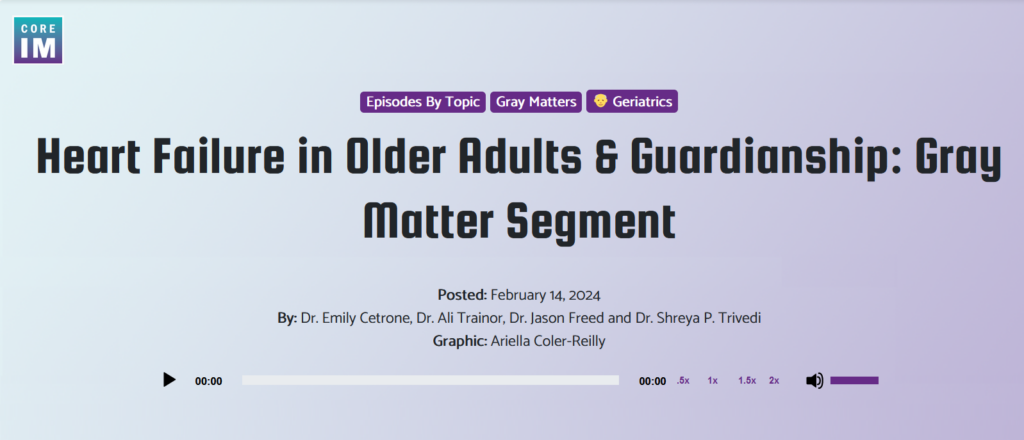 A recent episode of The Core IM podcast featured several UNC Department of Medicine practitioners who discussed issues related to heart failure and guardianship. The episode is divided into three segments.
A recent episode of The Core IM podcast featured several UNC Department of Medicine practitioners who discussed issues related to heart failure and guardianship. The episode is divided into three segments.
In Deep Dive 1, UNC geriatrician and assistant professor of medicine Dr. Emily Cetrone discussed ways for approaching guideline-directed medical therapy (GDMT) of heart failure with reduced ejection fraction in frail older adults. She said that geriatric patients in a nursing home setting are definitely more closely monitored than they would be at home. However, the rehab process can still be difficult.
“The most significant difference is that the nursing ratios [in nursing homes] are so much lower than we see in the inpatient setting.” Dr. Cetrone said that at the nursing home where she works, there are often 20 rehab patients per nurse. She also stated that although some physiological differences are a normal part of aging, clinicians should remember that some things, like frailty, are not a part of normal aging.
In Deep Dive 2, Bryan Godfrey, LCSW, a social worker at the UNC Geriatrics Clinic at Eastowne, discussed the timing of guardianship and the process for obtaining it. As a social worker, he believes guardianship should be a last resort. Godfrey says that there are only two ways in our society in which a person can be denied most of their rights. One is incarceration. The other is being deemed incompetent and to be given a guardian.
Godfrey said, “there may be clever ways around [guardianship] where we solve the problem without having to go through the whole legal process.” He lists healthcare power of attorney, behavioral change, and systemic changes as possible solutions. Godfrey says he prefers to identify the specific problem and try every non guardian way to solve this problem. However, he said, “if we still can’t solve it, that’s when we bring in a guardian.”
Lastly, In Deep Dive 3, UNC cardiologist and assistant professor of medicine Dr. Adam Moskowitz talked about the reevaluation of GDMT in a frail older adult once an adverse event has occurred. Dr. Moskowitz, said, “We know how to treat advanced heart failure in someone that’s 50 years old without a lot of other comorbidities. But then thinking about how do we do that in someone that is quite comorbid [and] advanced [in] age and then has…other communication difficulties and family and social issues going on, it gets much more cloudy in terms of knowing what is the best way to treat these people.”
To hear more about these issues, listen to the full episode here.